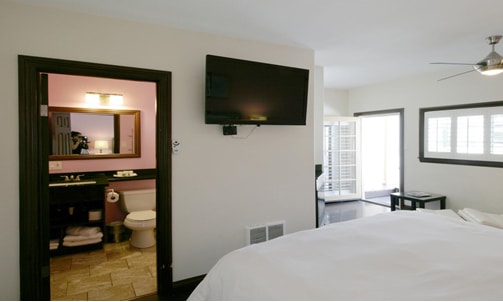Internet apps have dramatically improved our daily life. Ordering a cab is at your fingertips (thank you Uber and Lyft). You can cyber stalk your ex’s new significant other without leaving the comforts of your home (thank you Facebook and Instagram), and it has never been easier to rent a luxurious house for a weekend in Malibu thanks to AirBnB.
You can rent this gorgeous “Mermaid House” from a sweet hippy named Barbara, with ocean views and a lush garden for $218

Or you can rent this tiny, single “Garden View Suite,” at a nearby hotel for an average of $280.

We all know nothing in life is that easy, so here’s the truth – many very nice people on AirBnB, and other apps like it, are simply breaking the rules. Most cities (at least all the ones you actually want to visit – NYC, City of LA, and Santa Monica) have laws in place that prohibit private short term rentals for less than 30 days without the presence of an owner. Since none of us are taking 30 day vacations, so many of us lovers of AirBnB have been unwitting accomplices to city ordinance violations.
But here is the real bad news – cities (or hotel special interests who have influence over city councils) are cracking down, investigating and fining AirBnB and its hosts. In April of 2015, the City of Santa Monica issued 650 citations to AirBnB and a few other short-term internet app based rental platforms. Starting in August 2016, City of Los Angeles will begin enforcing transient occupancy taxes on short-term rentals, which AirBnB has agreed to collect from their hosts. The tax is expected to raise $5 million in revenue. Further, the City of Los Angeles is also considering a new law that would severely limit the number of days each year a host will be permitted to rent their property short-term. You can see how regulations of this sort will add up quickly, completely dis-incentivize hosts from participating and sky rocket the cost of doing business for the apps.
The backlash to AirBnB is understandable, as many long-term tenants and homeowners are concerned about the effect a large number of short-term renters can have on residential neighborhoods. One fear is that short-term rentals create housing shortages in already limited housing markets. If property owners are converting their homes and apartments to hotels, that conversely limits the traditional housing available in sought after neighborhoods. Long-term residents are concerned that if short-term rentals go unchecked, the character of their once quiet, residential neighborhood will be transformed into a transient community infiltrated with rotating tourists.
AirBnB is not taking all of this laying down. In San Francisco, AirBnB has filed a lawsuit against its own hometown over a new ordinance that requires all AirBnB hosts to register with the City at the risk of being fined up to $1,000 a day for each listing. This suit is still pending. The State of New York is considering a bill that would make all platforms like AirBnB completely illegal.
In June 2013, the Los Angeles Planning Commission voted to endorse rules that would require hosts to file applications with the City and start paying taxes. The rules would also limit the types of places that can be rented out and for how long. This may seem like a lot of regulation, but consider this: The City of Santa Monica’s AirBnB rules completely outlaw the renting of entire residences.
Most recently, on August 22 of last week, the City of Anaheim reversed course on requiring short term rental websites such as AirBnB to remove illegal listings or face hefty fines. The City of Anaheim considered federal communications law when deciding not to enforce parts of Anaheim’s short-term rental rules covering online hosting cites. However, the city will continue to identify and take action against unpermitted short-term rentals operating in Anaheim. The City changed its position shortly after it was sued by AirBnB over the penalties for hosting illegal listings. AirBnB dropped its lawsuit last Monday.
The jig may be up, if you elect AirBnB over a hotel, take advantage before it is either gone or becomes as expensive as a comparable hotel. If you are considering turning your home into a short term rental property through AirBnB, the risks may not be worth the benefit down the line.

